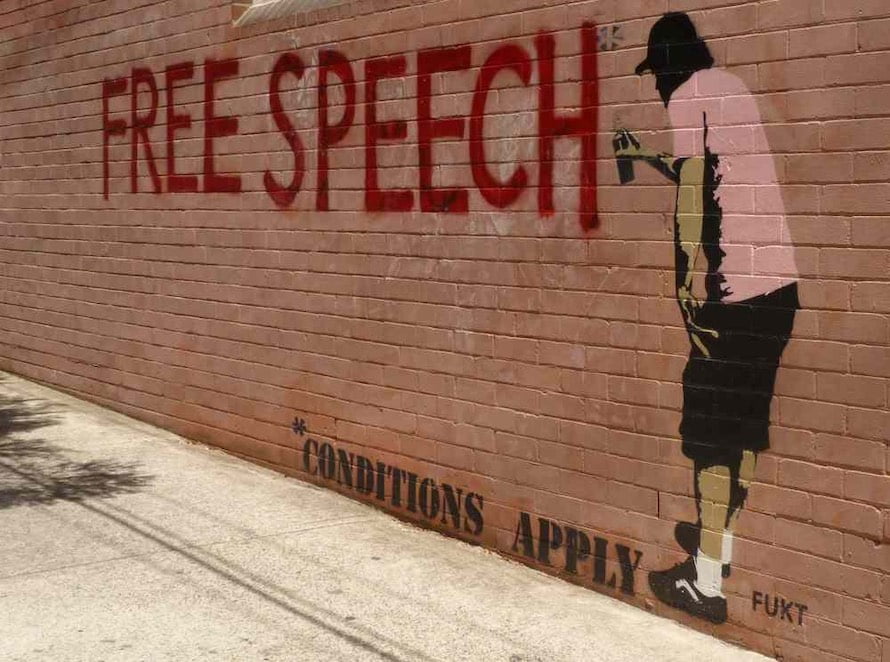Can There Ever Be Free Speech?
By Krishna Dharma Das | May 05, 2022

“It is by the goodness of God that we have those three unspeakably precious things: freedom of speech, freedom of conscience, and the prudence never to practice either of them,” wrote Mark Twain. Wise words from the esteemed author, although some of us may well doubt their wisdom, among them Mr. Elon Musk, who just purchased Twitter for a spectacular sum, vowing to make it a platform for “free speech”.
In many ways, it is understandable that freedom of speech is held so dear in our society. It stands in stark contrast to the oppressive ‘thought police’ dictatorships that heavily restrict any free expression. Nobody wants that. Furthermore, it is felt that without a free press, who will keep a check on our leaders? We need to be informed of their misdemeanors, should they get up to any, as well as be given the benefit of critical scrutiny of their policies. Twitter has often served that purpose, the freest of free presses in many ways, in that everyone has access to the platform to voice their views on anything and everything.
Problems arise, though, when my freely advertised opinion offends someone else. You will no doubt recall the tragic Charlie Hebdo affair of 2015 when twelve journalists were shot and killed and many others injured, after their magazine published images of the Prophet Muhammed, which many Muslims found deeply offensive. And this event was by no means singular. I can recall at least a few similar incidents in recent years where protests and violence erupted among adherents of different faiths when they felt affronted by a perceived slight to their religion.
It seems discretion should be exercised when broadcasting our views to the world. Even Twitter has found occasion to censure its users, famously banning President Donald Trump from its platform after sharing his frank opinions on their channel. As devotees of Krishna, we, too, have been offended at times by false depictions of our faith. These days numerous groups in society vigilantly police the press for abusive mentions of their beliefs and lifestyle. Many red-faced politicians and other public figures have had to issue apologies after speaking out just a bit too freely.
So can there ever be true freedom of expression? Firstly, just how free is our so-called ‘free press’? They are unlikely to be consistently objective in their reporting and analyses, being sold out to various vested interests that pay their salaries. Everyone knows how media outlets have different political and corporate affiliations. They also have their assumptions about what is right and wrong. Commenting on the offending Charlie Hebdo cartoons, the French newspaper Le Monde said, “Religious commandments and prohibitions cannot take priority over the laws of the republic. Religions… can be freely analyzed, criticized, indeed ridiculed.” This means that the “laws of the republic”, as made by men, are the absolute authority for them.
In fairness, some sections of the media point to what seems to them like nothing more than hypocrisy and cheating and have often brought about the downfall of transgressors. Watergate springs to mind, for example. There is certainly enough dishonesty around, but who should point it out? Should this be entrusted to journalists and social media influencers? According to Vedic wisdom, we need such checks, ensuring that even religious leaders act correctly, but this should be the state’s job. In turn, executive heads should be guided by pure-hearted saintly persons free from worldly ambition and, therefore, the tendency to exploit and deceive.
In other words, only those who are free can practice freedom of speech. Those entrapped by material desire cannot be entirely trustworthy, being liable to be carried away at any time by sensual and mental urges. Only the spiritually pure can resist such pressures and always act for our best interests. They know how speech should be properly employed for everyone’s benefit. How beneficial is it to human society to hear, in Srila Prabhupada’s words, “Mundane propaganda glorifying the temporary and flickering tidings of the material world”? This is what fills almost every publication these days, and it often does little more than disturb the mind. I know that I can hardly read the news on any day of the week without being plunged into sadness.
The Vedas advise us to hear speech that glorifies God, for this soothes the heart and mind, gradually ending all material misery. Saints and sages always engage in this kind of discussion, making it available to all of us through their sacred writings. Describing the behavior of such spiritually elevated persons, the Bhagavad Gita says that their speech is “truthful, pleasing, beneficial, and not agitating to others.” Vedic literature, such as the Gita, is replete with profound instructions meant to elevate us to realms of eternal happiness. Hearing about the exploits of ambitious and ruthless persons or the opinions of those ensnared by the temporary allurements of this world will simply keep us trapped in a cycle of material misery.
Let’s take a hint from the saints and sages and try to spend more time freely distributing the divine words of God and his pure representatives, discussing these among ourselves, rather than the ephemeral and mostly depressing stories constantly assailing us in the news. Hopefully, then the world will see a bit more peace than it has of late.














